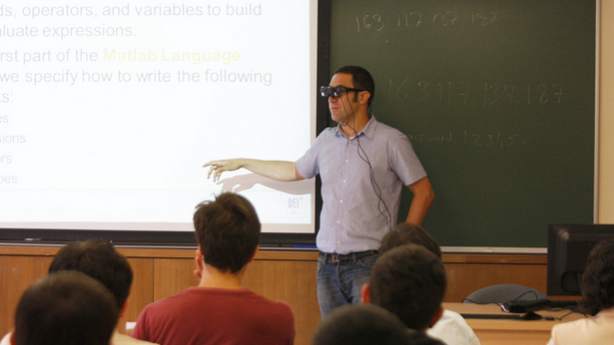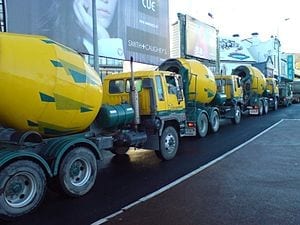
New technology is poised to disrupt America’s schools, and then the world’s
IN A small school on the South Side of Chicago, 40 children between the ages of five and six sit quietly learning in a classroom. In front of each of them is a computer running software called Reading Eggs. Some are reading a short story, others building sentences with words they are learning. The least advanced are capturing all the upper- and lower-case Bs that fly past in the sky. As they complete each task they move through a cartoon map that shows how far they have progressed in reading and writing. Along the way they collect eggs which they can use to buy objects in the game, such as items to furnish their avatar’s apartment. Now and then a child will be taken aside for scheduled reading periods with one of the two monitoring teachers.
The director of North Kenwood-Oakland school says this sort of teaching, blending software with human intervention, helps her pupils learn faster. It also allows teachers at this school—which, like other charter schools, is publicly funded but has some freedom to teach as it likes—to spend more time teaching and less time marking written work and leading pupils through dull drills of words and numbers. On top of that the school gains an accurate, continuous record of each child’s performance through the data its various programs collect and analyse.
The idea that technology can revolutionise education is not new. In the 20th century almost every new invention was supposed to have big implications for schools. Companies promoting typewriters, moving pictures, film projectors, educational television, computers and CD-ROMS have all promised to improve student performance. A great deal of money went into computers for education in the dot.com boom of the late 1990s, to little avail, though big claims were advanced for the difference they would make.
These claims were not entirely false: some bright, motivated children did use new technologies to learn things they would have missed otherwise. In many classrooms, too, computers have been used to improve efficiency and keep pupils engaged. But they did not transform learning in the way their boosters predicted. It is wise, therefore, to be sceptical about the claims made for the current wave of innovation. Yet there are also reasons to believe that a profound shift is occurring.
Over the course of the 20th century mass education produced populations more literate, numerate and productive than any the world had seen before. But it did so, usually, in an impersonal manner, with regimented rows of children chanting their times-tables as Teacher tapped the blackboard with a cane. Schooling could never be tailored to each child, unless you employed lots of teachers.
Teaching programs that monitor children’s progress can change that, performing a role more like that of the private tutors and governesses employed long ago in wealthier households. Data derived from each child’s responses can be used to tailor what he sees or hears next on the computer screen. The same data also allow continual assessment of his abilities and shortcomings, letting schools, teachers and parents understand both the pupil himself and the way human beings learn.
Such learning—called “adaptive” in the trade—is not the only advantage technology offers to today’s teachers and pupils. Online resources, from wikis to podcasts to training videos, are allowing both children and adults to pursue education on their own, either instead of learning in schools or colleges or as a supplement. It is, in the words of Bill Gates, who follows developments in this area closely and whose foundation funds some of them, “a special time in education”.
The Latest Bing News on:
Education technology
- Academic Approach to AI Maturing as Technology Evolveson May 9, 2024 at 12:14 am
At the Digital Universities U.S. event in St. Louis, digital transformation, the pandemic’s aftermath and the ongoing rise of AI were front and center.
- School of Science and Technology celebrate community partners with ceremonyon May 8, 2024 at 4:00 pm
The ceremony recognizes the individuals, corporations and local businesses that go the extra mile to provide support to the school.
- AI in Workforce Development: Businesses Must Harness the Power of Technology to Ensure Career Development Among Employeeson May 8, 2024 at 3:30 pm
In this episode of DisruptED, Zal.ai co-founder Kayvon Touran explores the role of AI in workforce development, highlighting how businesses are leveraging machine learning to align strategic goals ...
- Blockchain education initiatives take off amid crypto bull marketon May 8, 2024 at 12:00 pm
Despite traction, institutional education efforts on blockchain within the scientific community have remained lackluster.
- A new American education system is here. Here’s how one edtech company is leading the way.on May 8, 2024 at 10:48 am
One education company is at the vanguard of the movement. Cambium Learning Group is ushering in the new era of technology-aided education with an ethos of improving equity, helping students grow, and ...
- Education Tech Firm IXL Sued Over Collecting, Using Student Dataon May 8, 2024 at 9:48 am
IXL Learning Inc. faces a putative class action filed by three Kansas families alleging the education technology company violated federal wiretap law by collecting and selling their children’s ...
- Visionary transitions from education to innovative technology, life sciences, and AI educationon May 8, 2024 at 6:30 am
TORONTO, May 8, 2024 /PRNewswire/ -- Visionary Holdings Inc. (the "Company") (NASDAQ: GV), a private education provider with technology of artificial intelligence and life science on the cutting edge, ...
- Liaison Unveils Searchable Database of Education Programson May 7, 2024 at 3:28 pm
A new website includes articles, profiles and other information on institutions and educational programs to help prospective undergraduate and graduate students chart their course through school to ...
- Tanzania’s priorities in education as budget beefed upon May 7, 2024 at 2:21 pm
Dar es Salaam. The Ministry of Education, Science and Technology is expected to spend Sh1.96 trillion in 2024/25, about Sh200 billion more than its budget for the current financial year.Part of this ...
- The Stumbling Blocks for Artificial Intelligence in K–12 Educationon May 7, 2024 at 9:07 am
Challenges around generative AI could keep schools from bringing the technology into their teaching and learning environments.
The Latest Google Headlines on:
Education technology
[google_news title=”” keyword=”Education technology” num_posts=”10″ blurb_length=”0″ show_thumb=”left”]
The Latest Bing News on:
Teaching programs that monitor children’s progress
- Short on SC certified teachers, Richland 1 students are teaching themselves, parents sayon May 8, 2024 at 11:20 am
Everybody has a kid who either knows somebody or themselves doesn’t have a teacher in school,” Richland 1 board member Robert Lominack said.
- Online learning persists at Richland 1 due to record SC teacher vacancies, frustrating parentson May 8, 2024 at 1:00 am
Richland 1 students enrolled in high school classes without a certified teacher are using an online platform to teach themselves subjects like Algebra, Earth Science and Spanish with little adult ...
- Teacher apprentice programs are growing. Nevada offers a model.on May 7, 2024 at 10:30 am
One obstacle keeping people from careers in teaching is the cost of training. Enter apprenticeship programs.
- Supporting Early Childhood Education Teacherson May 6, 2024 at 9:28 am
With a new associate degree in early childhood education, the University of Delaware is helping working professionals advance their careers and deliver high-quality care ...
- Special education students still struggling with pandemic's setbackson May 4, 2024 at 6:01 pm
Pandemic disruptions set back students across the board. But when special education students lose ground, that can mean losing life skills, not just academic progress, educators say.
- Bridgeport school kids show progress to parentson May 3, 2024 at 9:36 pm
Elementary and middle school students at Bridgeport Exempted Village School District are getting some extra attention and excelling, with support offered through the Title 1 federal program. Parents ...
- Planning with children this school holidayon May 3, 2024 at 5:01 pm
As the school holiday starts, many parents find themselves facing a familiar dilemma of how to keep their children ... opportunity to monitor and make an evaluation of the progress.
- ‘Please don’t’: Alpine special education students must switch schools this fall — and parents are furiouson May 2, 2024 at 4:56 am
Utah’s largest school district will implement a new “consolidated” special education class structure, forcing about 150 special education students in grades K-6 to transfer to different schools.
- Best Budgeting Apps Of May 2024on May 1, 2024 at 2:32 pm
YNAB, short for You Need A Budget, is an award-winning budgeting program that specializes in ... investing for children within a custodial account and premium investing research and advice.
- Educationon April 29, 2024 at 10:28 am
Denver Public Schools teachers who’ve helped their Black students achieve academic progress are being studied by university researchers as part of the district’s Black Student Success work.
The Latest Google Headlines on:
Teaching programs that monitor children’s progress
[google_news title=”” keyword=”Teaching programs that monitor children’s progress” num_posts=”10″ blurb_length=”0″ show_thumb=”left”]











